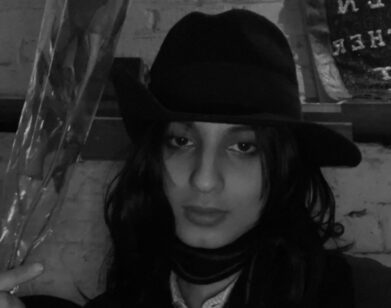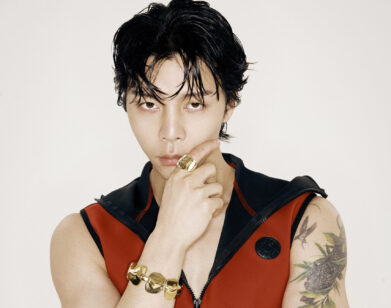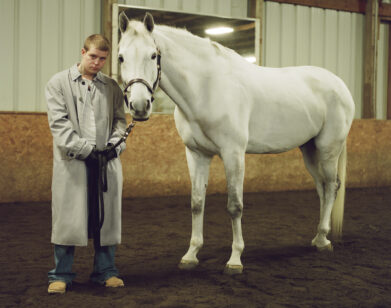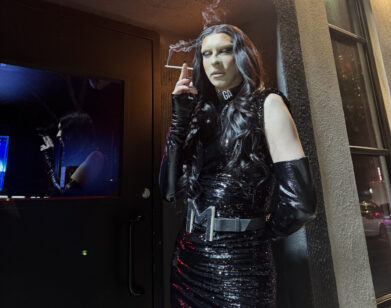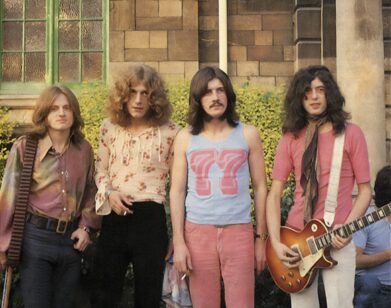JD Samson’s MEN: Shooting from the Hips, and Shaking Them Too

JD SAMSON (CENTER) AND HER BANDMATES. PHOTO COURTESY OF CASS BIRD
Dancing and thinking may be mutually exclusive to some. Not to JD Samson. The queer activist and musician’s sadly departed dance-punk trio Le Tigre proved that a bumping, humping good time might be married to politics and thoughtful provocation.
Since 2006, when Le Tigre went on a seemingly open-ended hiatus, Samson’s been a DJ, performance artist, actress (she cameo-ed in Shortbus), and calendar creator (her road trip catalogue, “JD’s Lesbian Utopia,” is a collector’s item). But MEN carried the Le Tigre torch: It’s Samson’s most musically club-friendly project to date, and one that wears politics resolutely on its lyrical and visual sleeves.
MEN’s debut album, Talk About Body, out February 1, is one shimmering, bass-thumping slice of synthpop after another, with incisive lyrics tht even take on the challenges of family planning for queers (“Credit Card Babie$”). None is more brain-burrowing than the recent single, “Off Our Backs,” about flipping the script in the bedroom and the board room. Its bears-and-chicks tug-of-war video, with Samson in a tank top throwing down for all she’s worth, is sexy, smart, subversive, and hilarious fun.
MEN’s lineup, through an evolution too convoluted to explore here, has over the years included Le Tigre’s Johanna Fateman and artist Emily Roysdon. It became best known through relentless touring with the likes of Peaches and The Gossip, as the trio of Samson, Ginger Brooks Takahashi, and Michael O’Neill. Takahashi recently left and was replaced by longtime Samson pal Tammy Hart. We sat down with Samson solo, to talk about body and a whole lot more.
JOHN NORRIS: JD, great to see you and congrats on an early contender for dance-pop record of the year! This record is actually comprised of a lot of songs that you have had—and you guys have been playing—for some time now.
JD SAMSON: That’s true, we started writing the record in 2007. And one of the songs was actually written by myself and Johanna Fateman prior to joining two projects, which now is the new MEN. We’ve been working on it a long time, and we traveled through many spaces and places together.
NORRIS: I know there was already an EP, but is there a sense of relief, like, “Finally we’ve got an album out”?
SAMSON: A lot of people in the industry think we did it backwards. We had never played a show before, and then we went to Europe and did a full six-week tour! So it was one of those things where like, how did people know about us and want to come? I guess it was our histories, and the Internet, word-of-mouth and stuff. So we’ve had a really good buildup.
NORRIS: Did there come a time when it was like, “You guys really need to wrap this thing up”?
SAMSON: Yeah, but we’d be like, “But we wanna do this tour for six weeks! The Gossip wants us to go on tour.” So we’d keep pushing it back. But we finished the record in June of last year, and decided to wait a while to put it out now.
NORRIS: Hands-down, one of my favorite tracks of the past year is “Off Our Backs.” Can you talk a bit about the genesis of that song? Did it start with a hook?
SAMSON: Every song on this record was written so differently. And for “Off Our Backs,” Michael and I wrote the track, the instrumental, and then I sat down to think of vocal ideas, and those are the exact words that came out of my mouth.
NORRIS: The chorus, “I’m a tease, I’m flippin’, can’t you see”—you guys have said it can be interpreted sexually, in which the top becomes the bottom and vice versa, or in a sociopolitical way.
SAMSON: Exactly. And that’s just kind of our language, also, in everyday life. You know, we’re always saying, “Oh my God, you totally got topped by that toll worker.” That’s just kind of how we think of things.
NORRIS: And the video. Was it shot in a desert somewhere—and how did that idea come about?
SAMSON: I went to film school, and I was kind stressing out about it, and I was like, “I’m gonna be really picky.” And Bryce Kass, who directed the video, came up with a treatment, and we had a lot of friends in common, and we just started vibing off of each other. I was like, “I want it to be something that’s a really simple idea of power. What about something like a tug of war?” Seriously, that’s all I said.
NORRIS: Not only is there a tug of war going on, with these bears and chicks both side by side—it lingers on crotch shots, too, which is pretty great.
SAMSON: That sexual innuendo part of it happened on set. We were watching them, and I was like, there has to be another element in this. At first they had just been tugging and I was like, “This has to be dirtier.” So we were like, “Pull out the baby oil, put the guys next to each other.” And two of those bears actually ended up going out on a date!
NORRIS: The next video, “Who Am I To Feel So Free,” you shot in Australia?
SAMSON: It’s actually on a cliff above the ocean in Sydney, and yeah, it was really beautiful.
NORRIS: That song is interesting to me, because lyrically, it refers to a lot of things that might be reasons we shouldn’t feel all that free—from radical surgery to getting harassed by border agents—and yet it’s got this upbeat, sort of positive thing. Is the idea that this band is dedicated to being as positive and communal as possible?
SAMSON: Yeah, actually. In Le Tigre, we tried very hard to change the feeling of “political” from “I hate that you did this” or “you’re doing this and it ruins us” to something that says, “Let’s get together and celebrate our diversity and challenge and gain equality.” And that is definitely something I learned from that group and brought to this project. For songs like “Credit Card Babie$,” “Who Am I to Feel So Free,” “Boom Boom Boom”—all of those songs do kind of call upon some depressing ideas, but when you bring them into this kind of music, it does create kind of an anthem. And what that does is bring us together in more of a “we” and help us think of ways in which we can come together and fight in a positive way, you know? So I guess that is part of the reason, and I also quite like the juxtaposition of talking about something sad or depressing over happy music, or talking about something happy over sad music.
NORRIS: Some people might say, “If you’re creating club-oriented music, why bother so much with lyrical concepts?,” the assumption being that if people are coming to dance, they don’t want to think. Do you just not buy that it has to be that way?
SAMSON: I come from a place where concept and content of music is really what I am interested in. If I write any music, that will be the number-one thing that I think about. Dance and politics go so well together because we are creating a space of freedom and people moving around and feeling like they are not going be judged. There’s confidence in dancing, you know? And I think that it’s important to create that space that is safe and comfortable.
NORRIS: You mentioned “Credit Card Babie$,” a song that gives us the memorable hook line, “I’m gonna fuck my friend.”
SAMSON: Well, I’ve always been someone who wants to have a family, and as you reach the age where you’re supposed to start doing that, you realize that as a queer person it is going to cost so much money. And not only the money, it is going to take so much effort. Whereas friends of mine who are straight or are in straight relationships could easily get pregnant the first time they tried. It means adoption or in vitro fertilization or a sperm donor, and all of the legal costs included.
I started feeling a lot of frustration and you have to really decide, “When are we gonna do this?” It’s all a plan, it’s not an accident. I think it’s a really cool anthem for queers of a certain age and a certain time and I think the genre works really well. It’s an underground dance-floor hit, and it’s been cool to leave it at that. There was talk of it being a single, but with muting the word “fuck,” it just doesn’t mean anything.
NORRIS: On that note—the Top 40 landscape these days is generally all Flo Rida and Black Eyed Peas, but MEN’s music actually could have a shot there. Would that interest you?
SAMSON: I think if that happened, and it was naturally built—like our friends told their friends, who told their friends, and it grew like that—I think it would feel really great and awesome, and I’m not afraid of that. I think if it was a forced thing, and it felt like we were doing something against our will, then it would feel pretty bad. But we’re totally open to success. And of course, we’re going have our politics and our lyrical content that means something, and we’re not going to stop doing that. So, if the world’s ready for that, then we’re ready for them.
MEN’S DEBUT ALBUM, TALK ABOUT BODY, IS OUT FEBRUARY 1 ON IAMSOUND. FOR MORE INFORMATION, VISIT THEIR MYSPACE.

